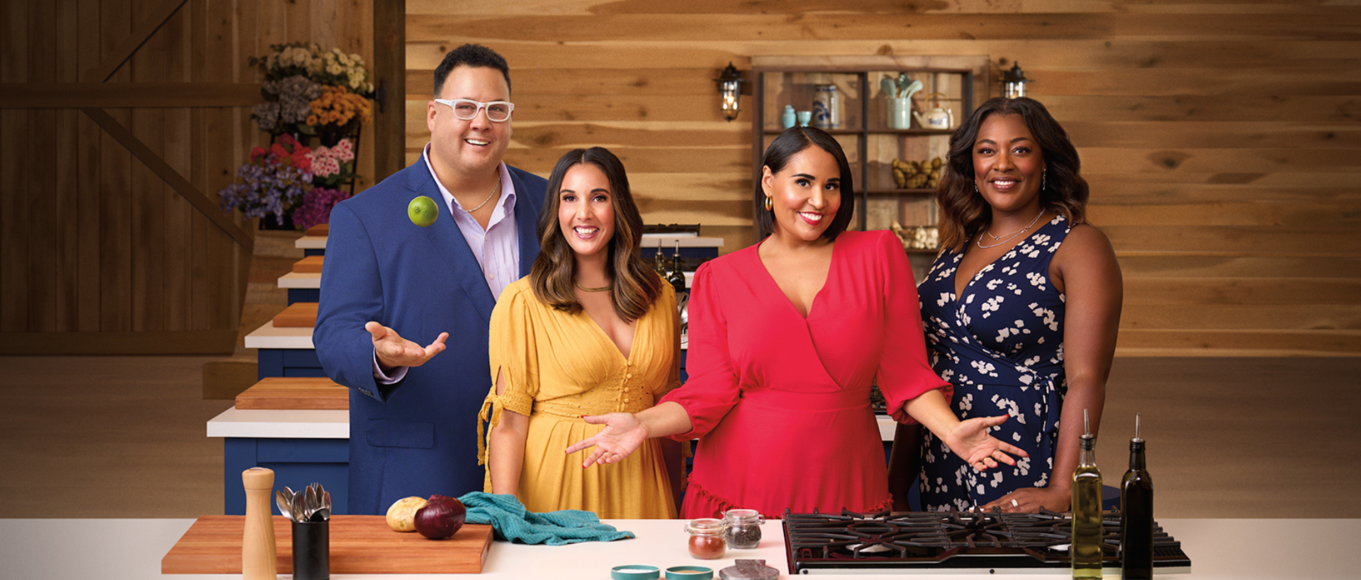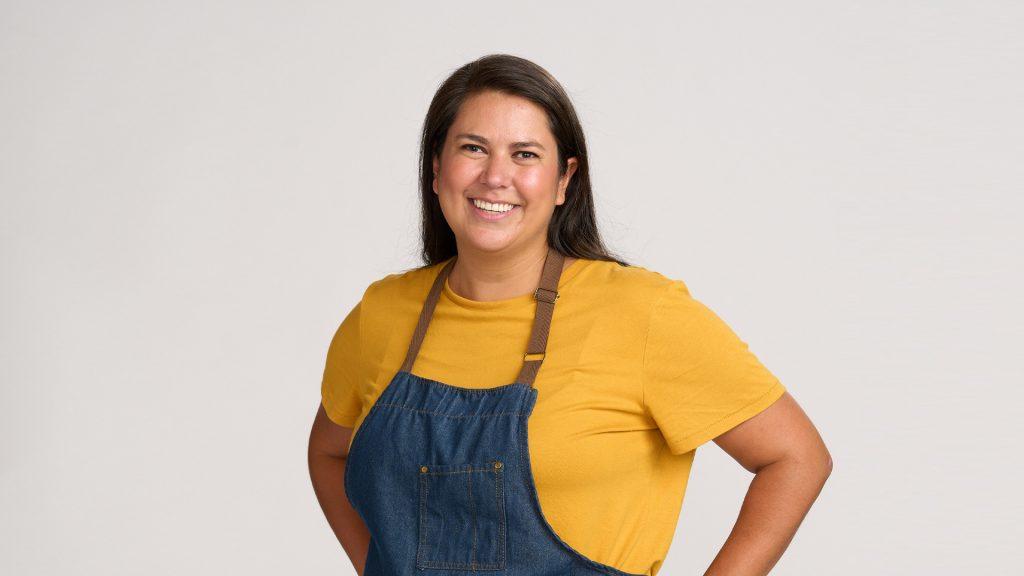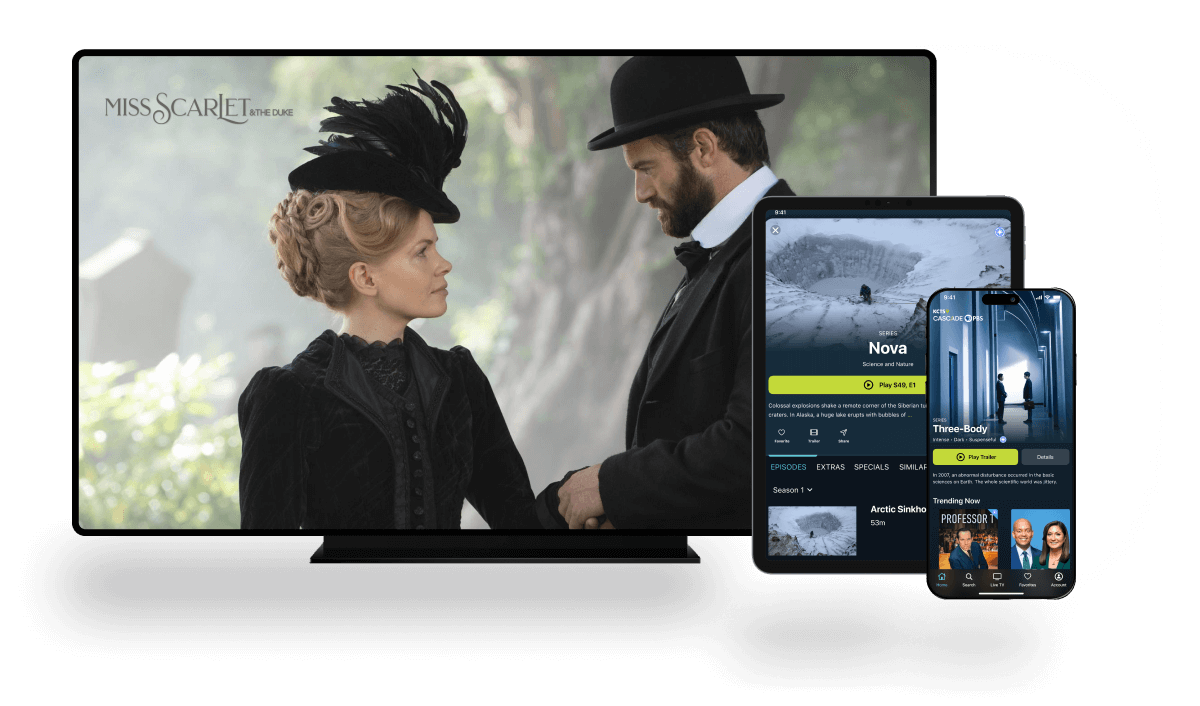
Meet the Seattle contestant on Season 2 of The Great American Recipe
Seattle’s Maria Givens represents the Pacific Northwest on Season 2 of The Great American Recipe.
The Great American Recipe is back for seconds! Season 2 of The Great American Recipe premieres Monday, June 19, at 9 p.m. The new season of the charming cooking competition series returns with its goal of celebrating America’s melting pot — and the cuisine that is cooked in it! KCTS 9 fans may recognize a familiar face this season, North Seattle’s Maria Givens.
Givens is a member of the Coeur d’Alene Tribe in Idaho and grew up in her ancestral homelands on Lake Coeur d’Alene. She first learned about the importance of food in her community through her father’s work as a lawyer fighting for the ownership of the Coeur d’Alene Lake as a means of food production for the entire reservation. When she wasn’t accompanying her father to court, she would go fishing and berry picking with her mother in the Idaho mountains.
Now a Seattle resident, Givens is the co-founder of Tahoma Peak Solutions, a Native American, woman-owned firm that focuses on strategic communications. According to its website, Tahoma Peak Solutions is “focused on empowering and building up communities in Indian Country” and “specializes in building food sovereignty movements that reflect traditional values.”
For Givens, food is vital in uniting her community and as a means of continuing to practice her culture. Her signature recipe is Wood-Fired Salmon with Huckleberry Sauce cooked Coeur d’Alene style over bedsprings and an open fire.
Fans of the series will also recognize some returning characters from last season — the host and judges! Host Alejandra Ramos and judges Leah Cohen, Tiffany Derry and Graham Elliot (of Seattle) are back in search for The Great American Recipe.
Ahead of the Season 2 premiere, KCTS 9 had the opportunity to chat with local contestant Maria Givens. Here’s what she had to say about The Great American Recipe, food sovereignty and more.
This interview has been edited and condensed.
What drew you to participate in The Great American Recipe?
I've been cooking since I was probably 10 years old. And, I have been cooking Native American foods on my Instagram, Native Soul Food, for probably five years now.
I really like putting out Native American foods for folks to really think about the stories behind them and understand that there are so many foods that we eat here in America that we take for granted. People don't think of them as Native foods, when really they are — like corn or, here in the Northwest, we think of salmon as a really Northwest food. But really, we have all of this salmon here in the Northwest because Native people have been protecting salmon for thousands of years.

Is there anything you'd like to share about how your family recipes or how your heritage inspired you to start cooking?
I grew up in the nineties in a middle class family where both parents were working and we had to get dinner on the table. So, I'd be helping my mom out a lot with just the cooking at home. I didn't really realize that we were cooking a lot of Native foods and that so much of our just kind of life growing up was around our Native foods.
My mom and I would go Huckleberry picking every summer. Go up into the mountains in Idaho and just pick huckleberries and learn how to make jam, to make Huckleberry pancakes. That's something we did all the time growing up.
That's kind of where my roots of Native foods come from. I just really like sharing those stories with folks and getting more folks to eat more Native foods.
I read that you helped pass legislation supporting food sovereignty for the Columbia River tribes. Could you talk a little more about that work?
There are two big pieces of legislation that I worked on. One was when I was working in the U.S. Senate for Oregon Senator Jeff Merkley and we worked on rebuilding housing for Native families on the Columbia River.
When the Columbia river dams were built back in the ‘30s through the ‘60s, they flooded out these huge Native villages on the river — and also flooded out non-Native towns. The non-Native towns got replacement housing within five years and the Native folks had to wait 60 years. So, when I was in Senator Merkley’s office, we were able to get some legislation passed. It was actually the last bill that President Obama signed in office. It's called the Water Resource Development Act. And, that helped build replacement housing for Native families on the Columbia River to continue the fishing lifestyle that we've had forever.
And then the second one was when I was working at the National Congress of American Indians. It's like the biggest nonprofit advocacy organization for tribes and I was the lead on the farm bill when that came up in 2018. So, I was helping lead the Native Farm Bill Coalition, which is over 170 tribes coming together on policy recommendations in the second largest bill in the country just behind the Defense Act, which is the largest. We were able to get over 70 different pieces of language in the farm bill that was beneficial for tribes.
What are some of your favorite things to cook?
I just love to experiment and take whatever is in the fridge or in the pantry and try to create something new. You know, it's funny being on a show called The Great American Recipe when really I kind of cook without recipes a lot [laughs]. I just like to throw things together.
I think one of my favorite things to cook, and I cook them in the show, is enchiladas. I love a good plate of enchiladas. I've really been getting into salads and meal prepping with salads. If I've got a big group of people to feed, it's always salmon.
What's in your enchiladas?
Green chili and chicken and Tillamook cheddar cheese.
What are some of your favorite Seattle foods or places to eat in Seattle?
I can think of one of my favorite places that inspired one of the dishes on the show. I love Pho Than Brothers on Aurora. I love pho. I went to the University of Washington, so everything on the Ave is always a great place to go for food.
I love going to Ivar's Salmon House on Lake Union just for the ambiance. My Uncle Henry actually back in the day helped them design the inside — all the canoes on the ceiling and all the art. He helped facilitate that, back when they were opening a long time ago.
I know there’s not a lot you can say in advance but what can you tell us about the show? What was filming like or the experience like?
Filming was crazy, and fun, and exciting. It's some of the hardest work I've ever done. We had early mornings and late nights.
The best part of the whole experience was getting to know the fellow contestants and we all bonded so much throughout the journey. We even got to know all of our little idiosyncrasies … all those little things when you have long days and you spend a lot of time with people. You really get to know them. We have a really active group chat where we are probably talking every day. We really bonded.
Is there anything you'd like to add about your cooking or your experience on the show?
I think one caveat that I'd like people to know is in the first episode I cook salmon. I normally would cook it over an open fire, but they wouldn't let me start a fire in the middle of the barn [laughs]. So, I had to cook it a different way. That’s not how I normally cook salmon — just so all the readers know. Normally, I do it over an open fire, but we couldn't do it.
And, I think it’s really good for everyone to think about Native foods in a little bit of a different way. So many of the foods that we love and enjoy are the result of Native people taking care of those foods for thousands of years.
So, any time you have a beautiful piece of Northwest salmon, thank the tribes for taking care of that food and for protecting the species for the last 1,000 years.
You can watch Maria Givens on Season 2 of The Great American Recipe beginning Monday, June 19, at 9 p.m. Or stream the series online or with the World’s Best TV app.

Caroline Gerdes
Caroline Gerdes is the Marketing Manager at Cascade Public Media. Before working for Cascade Public Media, Caroline was a freelance writer and she worked for National Geographic as a grantee and digital producer. She is also the author of the book, An Oral History of the New Orleans Ninth Ward.








